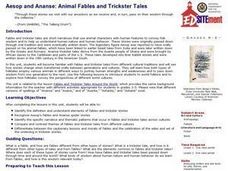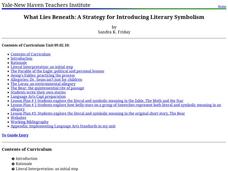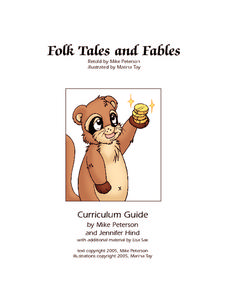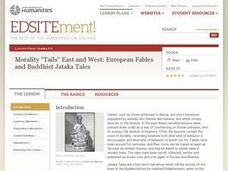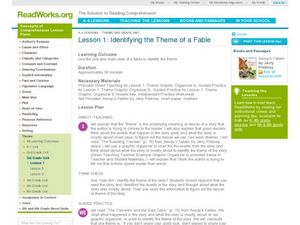Curated OER
Learning Life Lessons through Fables
Explore a variety of fables to learn life's lessons through engaging stories. Add rigor to the learning process with activities that include matching a a fable to the story's moral, short answer exit slips, and a three-column graphic...
American Museum of Natural History
Silk Road Fables
Talk about rabbit holes! With just this one resource, learners can travel the Silk Road listening to fables, meet a scientist who studies poisons (and whose favorite book is Alice in Wonderland), and listen to a video interview of an...
Curated OER
Aesop and Ananse: Animal Fables and Trickster Tales
Students complete compare and contrast activities dealing with fables and trickster tales to determine how each uses animals to portray human characteristics, specifically strengths and weaknesses, as well as pass wisdom from one...
Curated OER
Those Fabulous Fables
A video leads off this activity on fables, introducing the class to this important form of traditional storytelling. The group defines fable and hears an explanation of the origin of this type of folk tale. They summarize the story they...
Core Knowledge Foundation
Nursery Rhymes and Fables Tell It Again!™ Read-Aloud Anthology
A 206-page kindergarten anthology offers various nursery rhymes and fables. Each lesson covers a different reading and examines a concept that best relates to the rhyme or fable. Lessons begin with an introduction to the reading, go into...
Federal Reserve Bank
Financial Fables: Shopping Wisely with Olivia Owl
Cover two subjects with one lesson! First, dive into English language arts; read an eBook, answer comprehension questions, and complete a cause and effect chart about the financial fable, Shopping Wisely with Olivia Owl. Then, take...
Curated OER
Greek culture and Aesop's Fables
Tenth graders explain political and social thought during the Greek 6th and 5th centuries B.C. They research five to eight fables, figuring out the moral for each and writing an essay on how Aesop influenced the morals and ideals of...
Curated OER
The Coin and the Fable: Alaska quarter reverse
An Alaskan quarter and a book of fables is what you'll need to start this activity. Learners will use the image of the bear and the salmon found on the reverse side of the Alaskan quarter as inspiration. They will compose a fable about...
Yale University
What Lies Beneath: A Strategy for Introducing Literary Symbolism
“It’s not about what it is, it’s about what it can become.” You’re never too old for Dr. Seuss and using The Sneetches and The Lorax is a great way to introduce readers to allegories, parables, and literary symbolism. The lessons...
Scholastic
Folk and Fairy Tale Readers: The Tortoise and the Hare
Slow and steady wins the race to fluent reading with this printable version of "The Tortoise and the Hare". Presenting children with fun illustrations and a repetitive story structure, this resource is perfect for developing...
Curated OER
Writing Skills: Fables
Use fables as a fun way for English Language Learners to gain confidence and fluency in their reading and speaking skills. After reading a fable in class, they retell their story to a group of their peers. When this jigsaw activity is...
Scholastic
Folk and Fairy Tale Readers: The City Mouse and the Country Mouse
Support the growth of your emergent readers with this printable version of the classic fable "The City Mouse and the Country Mouse." Including supporting illustrations and simple dialogue, this story is perfect for developing the...
Weekly Story Book
Folk Tales and Fables
Pages and pages of engaging activities, worksheets, and writing projects on teaching folktales and fables await you! You don't want to miss this incredible resource that not only includes a wide range of topics and graphic...
Curated OER
Writing Fables
Students write their own fables. For this writing fables lesson, students use handheld computers to write a fable. The class designs a spreadsheet to organize common elements of fables. Students also edit each others' work.
Curated OER
Morality "Tails" East and West: European Fables and Buddhist Jataka Tales
Have your class explore Buddhist Jataka Tales to compare and contrast them to European fables. After defining fables, Jataka tales, and the elements of each, learners identify themes and patterns for both types of narratives and the...
Curated OER
Identifying Theme of a Fable
Third graders understand how to find the theme of a fable. In this theme lesson, 3rd graders use graphic organizers to record the events of a fable. Students use that information to determine the lesson of the story. Students do a guided...
Great Books Foundation
The Fox and the Stork
Young readers take part in a meaningful discussion following a reading of Aesop's fable "The Fox and the Stork." Five questions focus on the characters' actions and offering apologies.
Nosapo
Reading Activity: Circle the Right
Fables can teach us about life's morals, but they are also helpful for reviewing verb tense, spelling, and word choice. Three reading passages feature well-known fables, each with several opportunities for students to circle the correct...
Curated OER
Understanding Theme with Fables
What is the moral of the story? Ask your class to read a series of fables from which the last line has been removed. After supplying this concluding statement, they must justify their responses. This could be used as an individual or...
Curated OER
Snail Mail vs. E-mail: Let the Challenge Begin
Compare past and present forms of written communication with a fable to guide your pupils in discovering the benefits of various forms of written communication.
Read Works
The Boy Who Cried Wolf
Reinforce reading comprehension strategies and contemplate an important life lesson with a learning exercise featuring Aesop's fable, The Boy Who Cried Wolf. After reading a brief passage, scholars show what they know by...
Fluence Learning
Writing an Opinion: Is Pride Good or Bad?
Does pride really goeth before the fall, or can it be essential to one's development? Second graders read two of Aesop's fables that refer to pride in their morals, and write a short essay about whether pride is good or bad, based on...
Overcoming Obstacles
Cooperation and Teamwork
One of Aesop's fables begins with a lesson plan about cooperation and teamwork. Scholars listen carefully, taking note of the moral of the story. The class discusses their findings and why working with others makes work easier. Learners...
K5 Learning
Androclus and the Lion
Kindness is never a standalone act. Fourth graders read the classic tale of Androclus and his act of service to the lion, which is repaid to him by the lion in a Roman colosseum. After reading the passage, they answer four comprehension...
Other popular searches
- Aesop's Fables 3rd Grade
- Aesop's Fables Videos
- Aesop's Fables Activities
- Aesop's Fables Worksheets
- Aesop's Fables Unit
- Aesops Fables Unit
- Aesops Fables Powerpoint
- Aesop's Fables Lesson Plans
- Aesop's Fables Plays
- Aesops Fables Comparison
- Aesop's Fables Literacy
- Aesops Fables Literacy




